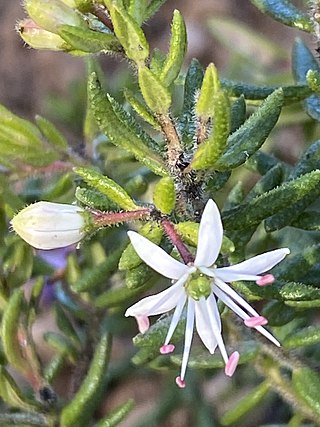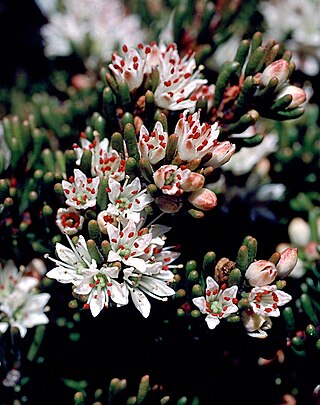
Leionema elatius, commonly known as tall phebalium, is a shrub species that is endemic to New South Wales and Queensland in Australia. It has glossy green, variably-shaped leaves and clusters of white-lemon flowers in spring.

Leionema coxii is a shrub species that is endemic to southern New South Wales, Australia. It has an upright habit, dark green, narrow leaves and clusters of white flowers in spring.

Leionema phylicifolium, commonly known as alpine phebalium, is a shrub that is endemic to south-eastern Australia. It is a small shrub with green, smooth, leathery leaves and pale yellow flowers in spring.

Leionema dentatum, commonly known as toothed phebalium is a species of large shrub or small tree that is endemic to New South Wales, Australia. It has variable leaves, slender branches and clusters of cream-yellow flowers in spring.

Leionema carruthersii is a small shrub that is endemic to southern New South Wales in Australia. It has mostly greenish-yellow flowers, distinctive stamens and lance to egg-shaped leaves.
Leionema ceratogynum is a dense shrub, it grows on the south coast of New South Wales, Australia. It has oval-elliptic shaped leaves, scented foliage and lemon flowers usually in groups of three arising from the leaf axils.

Leionema ellipticum is a shrub species that is endemic to Queensland in Australia. It is a small shrub with smooth green leaves and creamy-white flowers in spring.
Leionema equestre, commonly known as Kangaroo Island phebalium, is a shrub species that is endemic to South Australia. It is a small spreading shrub with rough, green leaves and whitish-pink flowers from late winter to October.

Leionema gracile, commonly known as Mt Greville phebalium, is a shrub species that is endemic to Queensland, Australia. It is a small shrub with spreading leaves, white petals and flowers from autumn to spring.
Leionema hillebrandii, commonly known as Mount Lofty phebalium, is a perennial, woody shrub endemic to South Australia. It has variable shaped leaves and pinkish flowers from late winter to spring.
Leionema lachnaeoides, is a tall shrub with aromatic leaves and yellow flowers from winter to late spring. It is restricted to the Blue Mountains in New South Wales.

Leionema microphyllum, commonly known as limestone phebalium, is a small shrub with terminal clusters of white-pink flowers in spring. It is a rare plant in Victoria and South Australia.

Leionema montanum, is a small shrub with terminal clusters of white-pink flowers in upper leaf axils in spring. It is endemic to Tasmania.

Leionema oldfieldii is a small shrub that is endemic to mountainous locations in Tasmania, Australia. It has dark green leaves, compact pale pink to white flowers from November to January.

Leionema ralstonii, is a small shrub with angular, smooth branchlets and pale green flowers in winter. It is restricted to the south coast of New South Wales.

Leionema rotundifolium, is a dense shrub with needle-shaped stems and pale lemon to white terminal flowers. It is found in New South Wales and Queensland.
Leionema scopulinum, is an upright shrub with glossy, dark green, narrow leaves and yellow flowers from autumn to spring. It is found in the Wollemi National Park in New South Wales.
Leionema sympetalum, commonly known as Rylstone bell, is a shrub with greenish-yellow tubular flowers in small terminal clusters at the end of smooth, angular branches. It has a restricted distribution, grows near Rylstone in New South Wales.

Leionema viridiflorum commonly known as green phebalium, is a species of flowering plant in the family Rutaceae. It is a small shrub with pale yellow-greenish flowers in clusters at the end of branches from winter to early spring. It has a restricted distribution in northern New South Wales.

Leionema westonii is a flowering plant in the family Rutaceae and is endemic to New South Wales. It has white flowers borne in upper leaf axils.















